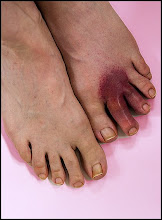What Is the Narrative?
Your “what is the narrative” question reminds me of a student joke from my days in Vermont circa 1963. Story goes that a Bennington student brought her knitting to class. Teacher, wishing to shake her loose from bougeois complacency, says, “Miss Fisher, do you think your knitting may be a substitute for masturbation?” Student answers: “Professor, when I knit I knit, and when I masturbate I masturbate.” In like fashion, when I photograph I photograph, and when I feel a narrative coming on I narrate, usually in letters to old friends.
I’m a child of the 60’s, and agree with Marshall McLuhan that “Art is whatever you can get away with.” I’m also an unreconstructed reductionist and a Peircean pragmatist, and believe that only operational definitions make sense. “Art,” like “evil” or “good,” is shorthand a fiction we agree to believe in for the sake of discussion. In the wake of 9/11 many atheists said “God bless America,” and meant it. If you quoted that back to them and said, “See, you really do believe,” they’d roll their eyes and say you were missing the point, and they’d be right. Any narrative or meaning you find in my photos should be taken in the same spirit: shorthand, a convenience, a peg to hang your feelings on. I’m a formalist and proud of it. Plato, Rousseau, Hitler, Stalin and Mao condemned formalism in art, reason enough to be all for it.
(Claudia answers: “i guess i hit your hot button leslie. like what decade do you think i was a child of? this photo regardless of what one is a child of is...Mannerism. to me ‘mannerism’ is a slavish devotion to ‘effect’ even if it is devoid of context and meaning. usually falls short of intention. classic definition for art history students is... http://www.artcyclopedia.com/history/mannerism.html” )
According to your URL, that description (focused on technique, devoid of meaning) is the one Delacroix used to diss Michaelangelo. I should be happy to keep such good company, but honesty forces me to protest: that characterization fits many, many works in many, many schools or periods; it’s too vague and general to be used as a definition of “mannerism.”
That said, of course my stuff is devoid of meaning and focused on technique. Those are positive qualities in my book. And of course it usually falls short of my intentions – whose work doesn’t? It would be cruel indeed to point to somebody’s art and say, “Ah – you’re satisfied with that?”
No offense, but I believe you’re one of the innumerable innocent victims of that arch-fiend Rousseau, author of most modern errors. Also I suspect the Zen you’re thinking of is the kind practiced in California.
(Claudia protests that “u don’t like us cali folk.”)
Oops, I didn’t know you were a Californian. No personal reflection intended. Besides, I’m sure it’s a great place; I was using “California” in its pejorative sense, the way some use the term “Mannerist.” I’ve never been to California, but everybody tells me it’s better than Heaven – the place angels go when they die. One of my best friends has been urging me to move to the Bay area for twenty years, but I can’t help noticing that he lives in Philadelphia.


0 Comments:
Post a Comment
Links to this post:
Create a Link
<< Home